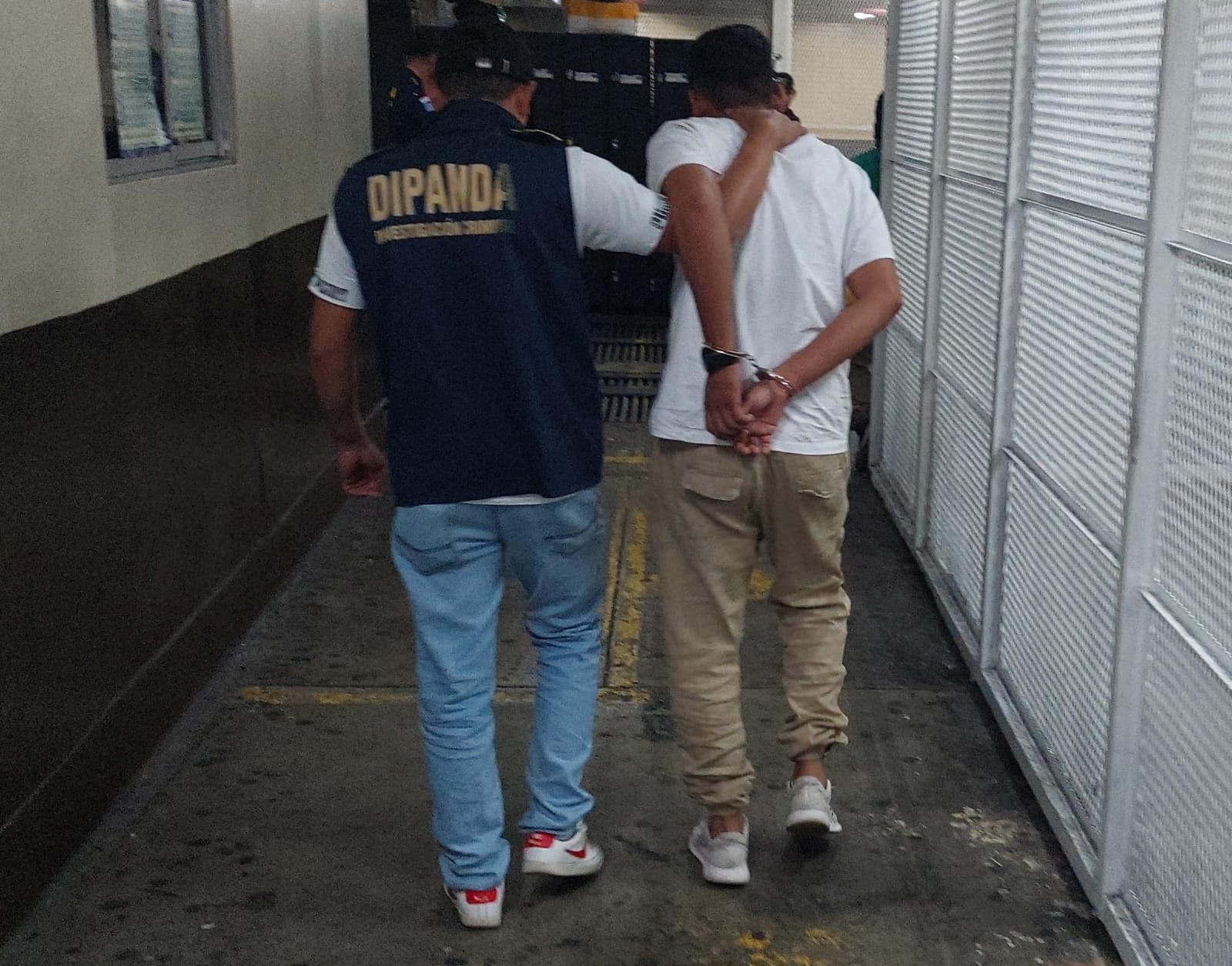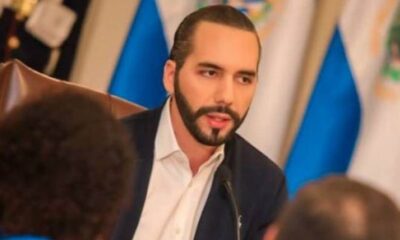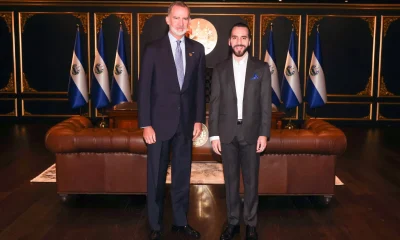Central America
Bukele and Argentine Minister Bullrich exchange their experiences on security

President Nayib Bukele received the Minister of Security of Argentina, Patricia Bullrich, in San Salvador, on Tuesday in a private meeting in which they exchanged their experiences on security and the fight against drug trafficking.
The Presidential House of El Salvador reported in an X message about the meeting that is part of a tour of the Central American country of the Argentine minister to “know the security methods” implemented by the Government of Bukele.
He added, without providing details, that “cooperation on security issues is getting closer and closer and we are sure that it will contribute to the well-being of both nations.”
For its part, the Ministry of Security of Argentina also indicated in X that Bullrich shared with the Salvadoran president about “the management that is being carried out in the fight against mafias and drug trafficking.”
In addition, he pointed out that the minister learned more about “the successful Salvadoran model” in reference to an emergency regime implemented to fight gangs.
He added that Bullrich also met with the vice president of El Salvador, Félix Ulloa, and thanked him for his collaboration in the visit made by the South American entourage.
In two days of visit to El Salvador, Bullrich visited the megaprison of the Center for the Confinement of Terrorism (Cecot), met with the heads of the Police and the Attorney General’s Office.
Bullrich, the former electoral rival of the Argentine president, Javier Milei, congratulated Bukele on Tuesday through a video for “resturing peace and tranquility” to his country.
The administration of Milei and Bukele are close after the Argentine president assumed his position as president.
Milei was in El Salvador on June 1 in the context of Bukele’s inauguration for a second consecutive term despite being prohibited in the Constitution.
The security policy of the Bukele Government, which has broad popular support, has focused since 2022 on the suspension of constitutional guarantees and mass arrests of alleged gang members through an emergency regime.
This measure was approved by the Legislative Assembly at the request of the Executive in March 2022 after an escalation of murders that claimed the lives of more than 80 people in three days attributed to the gangs, but that journalistic investigations of the media El Faro indicate that it took place after the rupture of a pact between these gangs and the Government.
In fact, the United States Government has sanctioned officials of the Bukele Executive on accusations of coordinating meetings with gang members.
The aforementioned regime has left more than 80,000 arrests and more than 6,000 allegations of human rights violations, including arbitrary arrests and torture.
Humanitarian organizations have also reported more than 300 deaths of detainees, most of them with signs of violence.
Central America
Guatemala President Says Starlink Terminal Found Inside Prison

Guatemalan President Bernardo Arévalo revealed on Tuesday that a Starlink terminal was discovered inside a prison in the country, highlighting corruption and the illegal introduction of advanced communication technology into the penitentiary system.
Arévalo did not specify which prison the device was found in but stressed that Starlink’s ability to connect directly to low-orbit satellites makes it particularly difficult to disrupt, posing a serious security risk.
The disclosure was made during a press conference attended by Interior Minister Marco Antonio Villeda and Defense Minister Henry Sáenz.
On January 6, specialized units of Guatemala’s National Civil Police (PNC), members of the Army and prison security personnel carried out Operation Sentinel at the Renovación 1 Maximum Security Prison for Men, located in Escuintla. According to the Interior Ministry, the operation aimed to reduce criminal activity, prevent illicit acts and stop the trafficking of prohibited items inside the prison.
During the operation, authorities also dismantled businesses operating near several prisons after detecting routers that were allegedly used to redirect internet signals into penitentiary facilities, according to local outlet Emisoras Unidas.
Tensions escalated further over the weekend of January 17 and 18, when inmates affiliated with gangs staged riots in three prisons. During the unrest, they took prison guards and a psychologist hostage, demanding extra-large beds, air conditioning, transfers to other facilities and access to the internet.
Central America
Guatemala Police Arrest Prison Guard Caught in the Act of Extortion

Guatemala’s National Civil Police (PNC) arrested a suspected extortionist in the act during an operation carried out in the department of Quiché, authorities reported.
According to the police report, the arrest took place in Zone 1 of Santa Cruz del Quiché after officers responded to a citizen complaint. Agents from Precinct 71 identified the suspect as Encarnación “N”, 41, who was serving as a guard in the Guatemalan Penitentiary System.
The suspect was caught while attempting to collect a package simulating an extortion payment totaling 25,000 quetzales. Police intervened at the precise moment the money was being handed over, allowing authorities to document the crime in flagrante delicto.
Following the operation, the detainee was placed at the disposal of the competent courts to face criminal proceedings.
The PNC emphasized that such operations aim to dismantle criminal structures involved in extortion, regardless of whether those implicated are linked to state institutions, and urged the public to continue reporting these crimes through confidential channels.
Central America
Honduras swears in conservative president Asfura after disputed election

Conservative politician Nasry Asfura assumed the presidency of Honduras on Tuesday with an agenda closely aligned with the United States, a shift that could strain the country’s relationship with China as he seeks to confront the economic and security challenges facing the poorest and most violent nation in Central America.
Asfura’s rise to power, backed by U.S. President Donald Trump, marks the end of four years of left-wing rule and secures Trump another regional ally amid the advance of conservative governments in Chile, Bolivia, Peru, and Argentina.
The 67-year-old former mayor and construction businessman was sworn in during an austere ceremony at the National Congress, following a tightly contested election marred by opposition allegations of fraud and Trump’s threat to cut U.S. aid if his preferred candidate did not prevail.
Grateful for Washington’s support, Asfura—who is of Palestinian descent—traveled to the United States to meet with Secretary of State Marco Rubio, before visiting Israeli Prime Minister Benjamin Netanyahu.
“We need to strengthen relations with our most important trading partner,” Asfura said after being declared the winner of the November 30 election by a narrow margin, following a tense vote count that lasted just over three weeks.
-

 Central America2 days ago
Central America2 days agoGuatemala seizes over a ton of cocaine hidden in flour at Pacific port
-

 International5 days ago
International5 days agoTrump-Era Defense Plan Prioritizes Border Security and Scales Back Global Commitments
-

 International5 days ago
International5 days agoBogotá and Quito Seek Dialogue After Tariffs and Power Cut Escalate Tensions
-

 International4 days ago
International4 days agoDelcy Rodríguez seeks political agreements after Maduro’s ouster
-

 International2 days ago
International2 days agoSpain’s irregular migrant population rises to 840,000, study finds
-

 International2 days ago
International2 days agoHistoric snowstorm paralyzes Toronto after 60 centimeters of snow
-

 International4 days ago
International4 days agoFederal immigration agents kill man in Minneapolis, sparking protests and outrage
-

 Central America1 day ago
Central America1 day agoGuatemala Police Arrest Prison Guard Caught in the Act of Extortion
-

 Central America1 day ago
Central America1 day agoHonduras swears in conservative president Asfura after disputed election
-

 Central America1 day ago
Central America1 day agoBukele leads public trust rankings as UCA survey highlights gains in security
-

 International1 day ago
International1 day agoDoomsday clock moves to 85 seconds before midnight amid rising global risks
-

 International1 day ago
International1 day agoWinter Storm Fern Leaves 30 Dead and Over One Million Without Power Across the U.S.
-

 Sin categoría1 day ago
Sin categoría1 day agoEight Killed in Series of Armed Attacks in Ecuador’s Manabí Province
-

 International2 days ago
International2 days agoRights group says nearly 6,000 killed in Iran protest crackdown
-

 International1 day ago
International1 day agoSpain approves plan to regularize up to 500,000 migrants in Historic Shift
-

 International2 days ago
International2 days agoVenezuela frees at least 80 political prisoners, NGO says
-

 Sin categoría1 day ago
Sin categoría1 day agoEl Salvador Launches Fourth Year of Ocean Mission to Protect Marine Ecosystems
-

 International2 days ago
International2 days agoEU launches new probe into X over AI-generated fake nude images
-

 International4 hours ago
International4 hours agoMissing Spanish Sailor Rescued After 11 Days Adrift in Mediterranean
-

 International4 hours ago
International4 hours agoRubio Says U.S. Could Participate in Follow-Up Russia-Ukraine Talks
-

 International4 hours ago
International4 hours agoFootball Fan Killed in Clashes After Colombian League Match
-

 International2 days ago
International2 days agoSevere winter storm grips U.S., leaves multiple dead as extreme cold persists
-

 International2 days ago
International2 days agoFrance debates ban on social media for children under 15
-

 Central America4 hours ago
Central America4 hours agoGuatemala President Says Starlink Terminal Found Inside Prison








































